|
|
|
Sort Order |
|
|
|
Items / Page
|
|
|
|
|
|
|
| Srl | Item |
| 1 |
ID:
151967
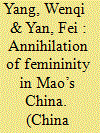

|
|
|
|
|
| Summary/Abstract |
During the Chinese Cultural Revolution, Mao’s famous political slogan ‘The times have changed, men and women are the same’ (时代不同了, 男女都一样) asserted that men and women were equal in political consciousness and physical strength. However, the slogan’s seeming emphasis on gender equality misconstrued the concepts of equality and sameness. In-depth interviews with former ‘sent-down’ youth illustrate how state rhetoric appropriated a discourse of women’s equality to silence women and depoliticize gender as a political category. For urban sent-down youth, gender inequality was absent from public discourse, and conflict between the sexes was concealed by a state discourse that constructed class struggle as paramount. Gender as a category was credited with solely political and pragmatic meaning and was utilized as a means for the communist government to achieve its own political and cultural utopia.
|
|
|
|
|
|
|
|
|
|
|
|
|
|
|
|
| 2 |
ID:
151966
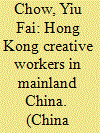

|
|
|
|
|
| Summary/Abstract |
China took up the discourses and agenda of creative industries increasingly in the first post-millennium decade. Amidst the attempt to turn from ‘made in China’ to ‘created in China’, would the translation of the creativity discourse usher in a better society in China? This article serves as one of the probing steps to ascertain what creativity enables and disables in China. I do so in an inquiry that departs from existing scholarship on two aspects. First, it follows a regional, cross-border labour flow. Second, it focuses on the people in the frontline of creative work. My study draws on the experiences of 12 Hong Kong creative workers who moved to Shanghai and Beijing. Their translocal and transcultural encounters allowed me to trace and foreground the particularities of creative practices in China. Like many fellow creative workers, my informants moved north to pursue better career opportunities. But they also wanted to do something more. Some of them managed to do so. At the same time, their stories were punctuated with disappointments, frustrations and continuous adjustments, categorized into what I call the precarious and the ethical. The findings of this inquiry pose questions on the hypothesis, the hype and the hope of creativity in China.
|
|
|
|
|
|
|
|
|
|
|
|
|
|
|
|
| 3 |
ID:
151965
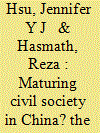

|
|
|
|
|
| Summary/Abstract |
This article suggests that Chinese NGOs do not have the conviction that they are part of an epistemic community in mainland China. Interviews conducted in four cities, Chongqing, Kunming, Nanjing and Shanghai, suggest that this can be attributed to a lack of set standards and professionalization governing their sector of operation. Further, the study finds that Chinese NGOs do not see knowledge production as their primary role within their organizational development life cycle. This may indicate a varying path towards the maturation of civil society in China, whereby Chinese NGOs do not conform to the organizational development process as outlined in extant NGO literature.
|
|
|
|
|
|
|
|
|
|
|
|
|
|
|
|
| 4 |
ID:
151964
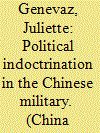

|
|
|
|
|
| Summary/Abstract |
This article examines the role played by the political indoctrination of the Chinese People’s Liberation Army (PLA) during China’s socio-economic reforms of 1987–2007. This period was a time of political transition during which the Chinese Communist Party transformed its ideology from a focus on revolution to a self-proclaimed unrivalled single-party regime. This article looks at how the party conveyed this ideological change to the armed forces. One of the four PLA general headquarters/departments, the PLA General Political Department (中国人民解放军总政治部), was responsible for the indoctrination of servicemen and -women. Examining the work of this agency over the 20 years following its major ideological effort in 1987, this article challenges the dominant literature according to which political indoctrination hinders military professionalization. The crux of this argument is that the General Political Department’s purpose behind indoctrination of the armed forces was not only to assert party control but also to build esprit de corps. Based on a series of previously untapped periodicals published by the General Political Department, this analysis contributes to understanding processes of authoritarian resilience in the contemporary Chinese state.
|
|
|
|
|
|
|
|
|
|
|
|
|
|
|
|
| 5 |
ID:
151968
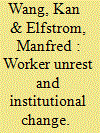

|
|
|
|
|
| Summary/Abstract |
Worker protests in China are increasing in frequency, and workers are making more ambitious demands. However, it is unclear whether this activism is, on the whole, drawing a reformist or conservative response from officials. Using a 2014 survey of city-level leaders from China’s official trade union federation, we find that an acknowledgement of the seriousness of today’s labour disputes and of how the country’s industrial relations are changing is positively correlated with respondents’ optimism regarding the likelihood of changes to China’s political system. To determine exactly what this means ideologically, we further compare reform optimists and pessimists with regard to their support for a range of more specific policies, finding that those who believe systemic changes are close at hand have different views from their peers regarding the importance of engagement with global civil society and a tripartite (government, union, employer) approach to managing workplaces. This provides tentative support for the idea that reform optimists are reform supporters and that interest in change among Chinese officials, at least at the level studied here, is growing alongside workplace conflict.
|
|
|
|
|
|
|
|
|
|
|
|
|
|
|
|
|
|
|
|
|